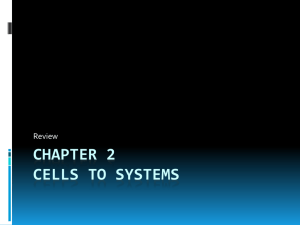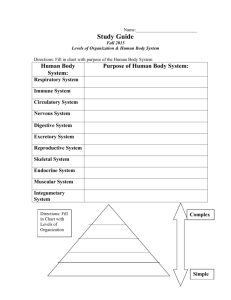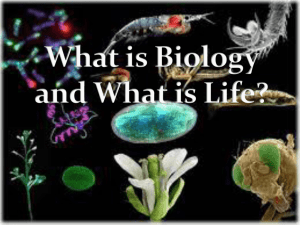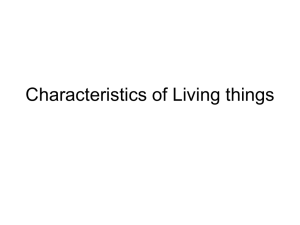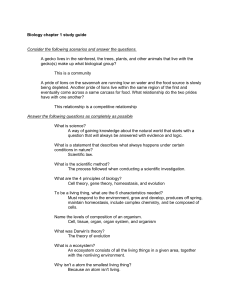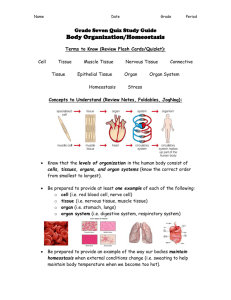The Science of Biology
advertisement
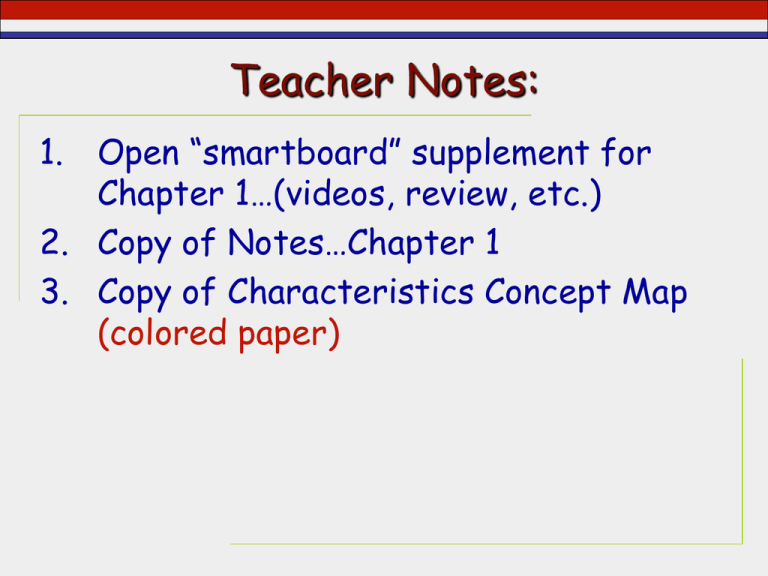
Teacher Notes: 1. Open “smartboard” supplement for Chapter 1…(videos, review, etc.) 2. Copy of Notes…Chapter 1 3. Copy of Characteristics Concept Map (colored paper) The Science of Biology Chapter 1 What is Biology? The study of life (Greek word bios, meaning life and logos, meaning study Properties of Life What characteristics do living creatures have in common? Biology: Video Living creatures GROW & DEVELOP • Change over an individual’s life time – get bigger – mature • so they can reproduce Living creatures use ENERGY • Metabolism – all the reactions your body performs to make & use energy • eating & digestion & elimination of waste • synthesis = building mitochondria • cellular respiration = making energy Living creatures RESPOND AND MOVE • Respond to internal changes – Homeostasis • maintaining balanced conditions inside the body • Respond to external changes Living creatures REPRODUCE • Make the next generation Asexual-single parent Sexual- two parents (sperm and egg) Living Creatures are made of CELLS • All living organisms are made up of cells. • Can be made up of one cell (unicellular) or trillions of cells (multicellular). Living creatures are ORGANIZED • All made of the same collection of chemicals, but we are organized as… – organelles & cells • plant cells & animal cells plant cell animal cell Living creatures are ORGANIZED • All made of the same collection of chemicals, but we are organized as… – organs & organ systems • respiratory, circulatory, digestive, etc. Living creatures have DNA • Has a set genetic code that is passed down from parent to offspring • directions for inheritance • DNA AND RNA Living creatures EVOLVE • Living things adapt and can evolve (change of time) Characteristics of Life: Video Complete Characteristics of Life CONCEPT MAP with 11:00 appointment ORGANIZATION • ORGANISM-anything that possesses all of these characteristics of life. • SPECIES-organism that can interbreed and produce fertile offspring (if not leads to EXTINCTION) Levels of ORGANIZATION Organization: Video Levels of Biological Organization Biosphere-Earth Scientific Inquiry: Thinking Like a Scientist • Scientists collect data by making careful observations. • An observation is a record or note made by studying something using the senses. • Data is information gathered through observations. • An inference is a deduction or assumption based on observations and prior knowledge. Inferences…… THE SCIENTIFIC METHOD Reject & Revise Hypothesis Additional Hypothesis THEORY: THE SCIENTIFIC METHOD Observation Hypothesis Experiment Collect Data Analyze Additional Hypothesis Conclusion THEORY: Reject & Revise Hypothesis Any Questions? Quick Review… 1. The process by which organisms keep their internal conditions relatively stable is called a. b. c. d. metabolism a genome evolution homeostasis 1. The process by which organisms keep their internal conditions relatively stable is called d. homeostasis Which sequence illustrates the increasing complexity of levels of organization in multicellular organisms? (1) cell → tissue → organ → organism→ organ system (2) cell → tissue → organ → organ system → organism (3) tissue → cell → organ → organ system → organism (4) cell → organism → organ system → organ → tissue Which sequence illustrates the increasing complexity of levels of organization in multicellular organisms? (2) cell → tissue → organ → organ system → organism The diagram below represents levels of organization in living things. Which term would best represent X? (1) human (2) stomach (3) tissue (4) organelle The diagram below represents levels of organization in living things. Which term would best represent X? (3) tissue 4. A housefly ingests raw garbage, digests it, and later egests some materials. With which life process are all of these events most closely associated? a. b. c. d. growth nutrition transport synthesis 4. A housefly ingests raw garbage, digests it, and later egests some materials. With which life process are all of these events most closely associated? a. nutrition “SmartBoard” REVIEW#1 “SmartBoard” REVIEW#2 Study for TEST • Notes • Vocabulary • Misc. work given (concept maps, worksheets, etc.)
